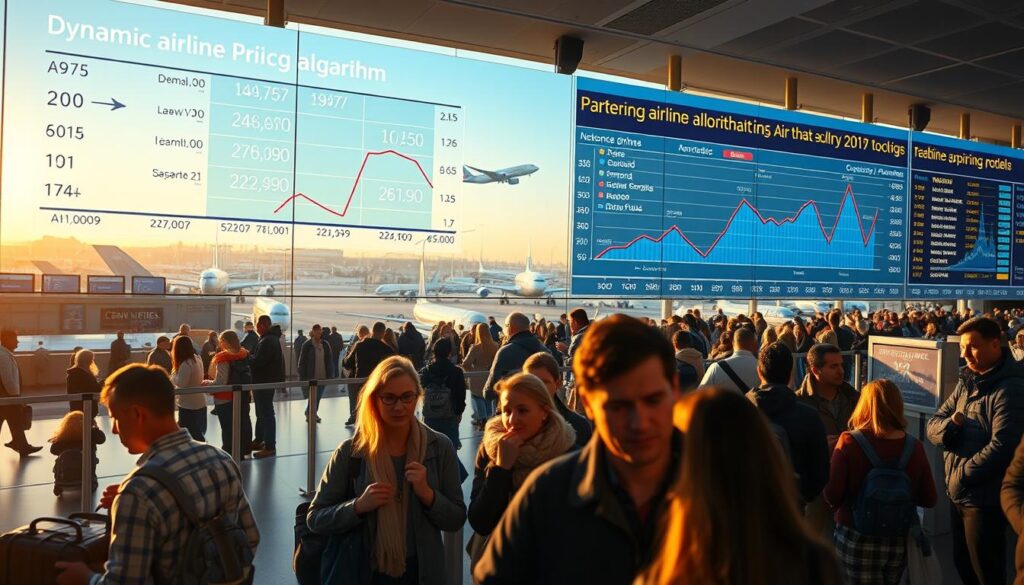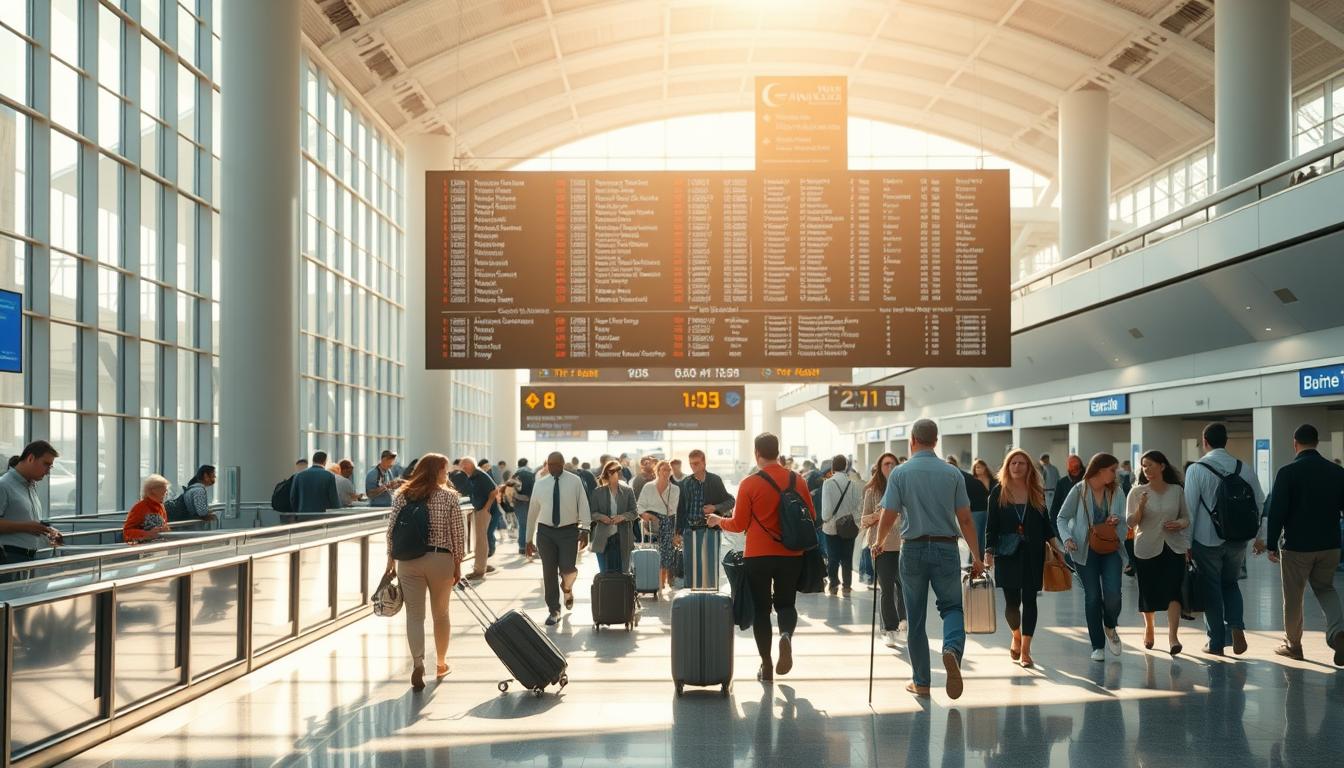Are you tired of spending too much on flights and hotels during peak travel times? You’re not alone.
As the peak travel season gets closer, many face high flight prices and hotel rates. But, with smart strategies, you can have a worry-free vacation.
Experts say being flexible is crucial when booking flights and hotels during peak times. By being flexible and planning early, you can find affordable options and enjoy your trip.
Key Takeaways
- Be flexible with your travel dates to save on flights and hotels
- Book your flights and hotels well in advance to secure better rates
- Research and compare prices to find the best deals
- Consider alternative accommodations, such as vacation rentals
- Plan ahead to avoid last-minute price hikes
Understanding Peak Season Travel Dynamics
To tackle the challenges of peak season travel, knowing the key factors is crucial. Prices are influenced by holidays, special events, and the time of year. Travelers can make better choices by understanding these factors.
Defining Peak Seasons for Popular Destinations
Peak seasons differ for each popular spot. For example, Miami and Hawaii are busiest in summer. Meanwhile, Whistler and Aspen see their peak in winter. Knowing these patterns helps in planning your trip. Researching your destination is vital for finding the best travel times.
The Supply and Demand Behind Price Fluctuations
The law of supply and demand greatly affects prices in peak seasons. As demand rises, so do prices. It’s important to grasp what drives demand. Airlines and hotels adjust their prices based on demand. Knowing this can help you book at the right time and save.
Seasonal Patterns in the American Travel Market
In the U.S., seasonal patterns shape travel trends. Summer, winter holidays, and spring breaks are the busiest times. By understanding these trends, you can travel during the shoulder season. This way, you can find lower prices and enjoy a calmer trip.
Planning Your Travel Calendar Strategically

Planning your trips can help you save money. It’s all about knowing when to travel and finding deals. This way, you can enjoy your trips without spending too much.
Identifying Shoulder Seasons for Better Deals
Shoulder seasons are the sweet spot between peak and off-peak times. They offer good weather and lower prices. For example, visiting Europe in April or May can save you money compared to summer.
Key destinations often have shoulder seasons that are worth exploring:
- The Mediterranean in spring
- Northern Europe in late summer
- Caribbean islands in September or October
Traveling during these times lets you enjoy your trip without the high costs of peak season.
The Ideal Booking Timeline for Different Destinations
The best time to book varies by destination. Hopper suggests booking flights 25 to 150 days in advance for cheaper prices. For hotels, booking early is wise, especially in popular spots during peak times.
Having a travel budget plan for the whole year helps you set goals and make smart booking choices.
Here are some tips for different places:
- For domestic flights, book 1-3 months ahead for the best deals.
- International flights might need booking 6 months in advance.
- For hotels, booking 2-4 weeks early is smart for less busy places.
Peak Season Travel, Flight Price Hikes, and Early Hotel Bookings: The Complete Picture

Peak season brings higher prices for flights and hotels. But, there are ways to reduce these costs. Knowing how prices go up is key to smart travel planning.
How Airlines Implement Surge Pricing Models
Airlines adjust ticket prices with complex algorithms, known as surge pricing. This method helps them earn more during busy times. Prices change based on demand, past bookings, and even what you’ve looked at online. Airlines use this data to set prices that match demand.
Hotel Inventory Management During High Demand
Hotels change room rates based on how full they are and what they think will happen. When it’s busy, they raise prices. Booking early can get you a better rate before prices go up. Hotels might offer discounts if they’re not full, but it’s not always reliable.
The True Cost of Waiting to Book
Waiting to book can lead to higher costs for flights and hotels. Not just the price, but also missing out on your preferred options. Booking early can save you money and ensure you get what you want. It’s important to think about the pros and cons of waiting versus booking early.
In summary, knowing how airlines and hotels price things during busy times helps you plan better. Understanding surge pricing and hotel strategies can help you save money on your trips.
Flight Booking Tactics to Beat Peak Season Surges

Knowing when to book domestic and international flights is key to avoiding high prices during peak seasons. When many people travel, prices go up. But, with smart booking strategies, you can find cheaper flights.
Optimal Booking Windows for Domestic vs. International Flights
Booking times differ for domestic and international flights. For domestic flights, book 1-3 months in advance for the best prices. International flights need more time, book 3-6 months in advance.
Booking on certain days, like Tuesdays and Wednesdays, might get you a better deal. But, prices change, so be ready to book when it’s right. The best day can change based on the airline and route.
Using Incognito Mode and VPNs for Better Rates
Some think incognito mode or VPNs can help get better rates by not tracking your browsing. It’s worth trying as part of your cost-saving plan.
For the best deals, use tools like Google Flights and Hopper. They help track prices and find the best booking times.
Early Hotel Booking Strategies That Save Money
To save money on hotel bookings during peak travel seasons, it’s crucial to adopt early booking strategies. Understanding how hotel pricing changes with demand is key. This helps secure affordable rates.
Hotels adjust prices based on how full they are. Prices go up in peak seasons. But, they also offer discounts if they’re not full enough.
When to Lock in Hotel Reservations for Maximum Savings
Booking your hotel at the right time is key for saving money. It’s best to book at least 2-3 months in advance for peak season. This way, you get early booking discounts and rate guarantees.
- Be aware of rate guarantees that allow you to lock in a rate and potentially get a refund if the price drops.
- Understand the cancellation policies of your hotel to avoid penalties if your travel plans change.
- Consider booking directly with the hotel to negotiate better rates or additional perks.
Some hotels offer rate guarantees that promise to refund the difference if the rate drops after booking. This is great for travelers who are flexible with their plans.
By using these early hotel booking strategies, you can handle peak season travel without breaking the bank. It’s all about being informed, planning ahead, and using the right tools and policies to your advantage.
Destination-Specific Strategies for Popular U.S. Vacation Spots
Traveling to popular U.S. spots can be more fun if you know the area well. Each place has its own peak seasons. Knowing these can help you save money on your trip.
Coastal areas get really busy in summer, making things pricier. But, there are ways to beat the crowds and save money.
Coastal Destinations: Beach Season Tactics
The beach season in coastal spots starts in late spring and goes to early fall. Booking your trip during the shoulder season can save you a lot. Experts say this time offers better deals on flights and hotels.
Also, try visiting less crowded beaches in your area. Many famous spots have hidden beaches that are cheaper but just as nice. Do your homework to find these spots.
Another smart move is to plan your accommodations wisely. Look for hotels or rentals with package deals or discounts for longer stays. Being flexible with your travel dates can also find you cheaper options.
- Research alternative accommodations such as vacation rentals.
- Look for package deals that include flights and hotel bookings.
- Consider visiting during the shoulder season for better deals.
Alternative Accommodation Options During High Season
Looking for something different during high season? Alternative accommodations might be the way to go. Hotels are often pricey and less flexible during these times.
Beyond Hotels: Vacation Rentals and Home Exchanges
Vacation rentals and home exchanges are gaining popularity. They offer more space and amenities than hotels. Plus, they can be more affordable.
Vacation rentals feel like home, letting you live like a local. You can find everything from cozy apartments to big villas. Many also have kitchens, which can save on food costs.
Home exchanges let you swap homes with another traveler. It’s a cost-effective way to experience a new place. You get to see the local life and find hidden spots tourists miss.
Thinking about vacation rentals or home exchanges during peak season travel? Start planning early. Popular spots and homes fill up fast.
- Research thoroughly: Find places that fit your needs and budget.
- Read reviews: See what others have to say about their stays.
- Plan ahead: Book early to get the best deals.
Exploring alternative accommodation like vacation rentals and home exchanges can make your peak season travel better. You’ll get more flexibility and might save money too.
Technology Tools and Resources for the Strategic Traveler
In today’s digital age, smart travelers use technology to plan their trips better. They find affordable flights and places to stay by using the right tools. This gives them an edge in planning their travel during peak seasons.
Technology has changed how we travel, making it easier and cheaper. There are many tools out there, from price tracking apps to travel planning websites. These help you deal with the challenges of traveling during busy times.
Price Tracking Apps That Actually Work
Price tracking apps are a big help for those looking for great deals. Apps like Hopper and Google Flights let you track prices and get alerts when they drop. They use data to predict price changes, helping you make smart booking choices.
Using these apps saves you from constantly checking prices. It helps you make better decisions about when to book. This can lead to big savings, especially during busy travel times when prices go up.
To save more, set up price alerts for your destinations and travel dates. This way, you’ll know right away when prices fall. You can then grab the best deals before they’re all taken.
Putting It All Together: Your Action Plan for Affordable Peak Season Travel
Traveling during peak season needs a smart plan for booking flights and hotels. Knowing when to travel can save you money. Experts say planning ahead, being flexible, and using the right tools can lead to big savings.
Start your action plan by finding the shoulder seasons for your favorite places. Being flexible with your travel dates can get you better deals. Also, use technology like price tracking apps to find the best prices.
Timing is key for peak season travel. Booking flights and hotels at the right time can save you a lot. By following the tips in this article, you can have a great vacation without breaking the bank. Your plan should mix smart planning, flexibility, and the right tools to tackle peak season travel.
